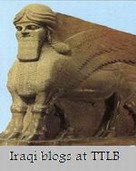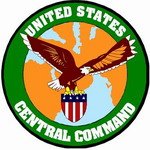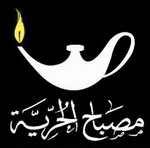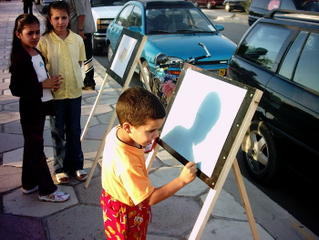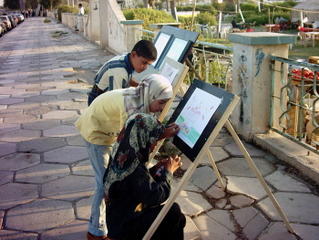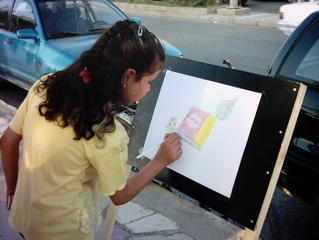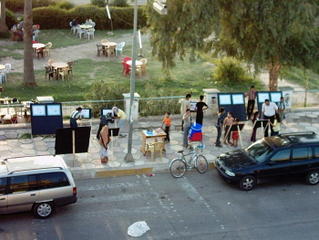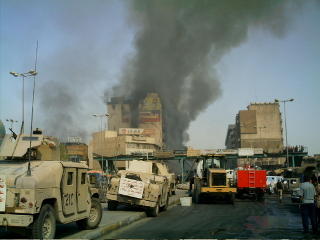
Wednesday, September 28, 2005
| Today, American forces in the city of Kerbala officially handed over security responsibilities to Iraqi army and police units in the city. This makes Kerbala the second Iraqi province that undergoes this transition of power after a similar step was taken in Najaf nearly two months ago. The event which was attended by military and civil officials from both parties also included a parade for the Iraqi units that are going to assume responsibility for peace keeping tasks in Kerbala. Unfortunately no web links are available at the moment as the only source that reported the news was Al-Hurra TV. However web links will be added to this piece once available. |
From the home town of Gilgamesh, friends of democracy has an interesting report on constitutional education workshops they're organizing there.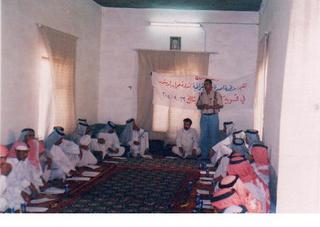 Like some of you, I wondered whether women were also included or not; I have been told that there were separate workshops for women due to the nature of the society in such conservative places. Photographs will hopefully be available soon. |
| No one wants to come from outside to monitor the referendum? Fine! Because Iraqi intellectuals, artists and writers have taken it upon themselves to do the tasks, Azzaman reports: In the absence of foreign monitors due to mounting violence, Iraqi writers, artists and other intellectuals have volunteered to oversee the referendum on the constitution scheduled for October 15. Isn't that great? |
Tuesday, September 27, 2005
| As you can see, I'm facing some difficulties in putting the comments section back on track; actually haloscan is giving me a hard time. I tried to get things fixed but it doesn't seem to be responding. This will take the priority until it's solved. I appreciate your patience. By the way, how do you like the new colors of the blog? Seems solved to me, does it look right to you too? |
| "Baghdad city council discusses paying money to residents instead of the to be cancelled food rations" This headline appeared on Al-Mashriq paper this morning, the report within says that the government's decision to stop distributing food rations is reaching the final steps of discussions and it will be adopted sometime next year. The report attributes the decision to a deal between the government and the world bank and international trading organization; the deal is to provide Iraq with loans and grants up to 40 billion $ over a certain number of years for the purpose of reconstruction and development as well as giving Iraq a membership in the world trading organization. In return for that, Iraq has to fulfill a few requirements, one of which is to stop subsidizing whatever is being subsidized right now; food rations, electricity, fuel, phones…etc. The lack of transparency on the government's part had given rise to suspicions about the reality of the shortages in fuel and the delay or complete absence of several items of the food rations and some people here think that these shortages and delays are actually a method invented by the government to prepare the people for the withdrawal of subsidization. I am personally supportive of adopting free market policies in Iraq as that's an essential contributing factor for development and I also believe that stopping subsidizing fuel can put an end to the smuggling operations and their devastating effect on the economy since smuggling is only happening as a result of the huge difference in fuel prices between Iraq and the neighboring countries but why this lack of transparency? All we heard from officials about this subject was foggy hints and evasive answers and this is wrong, especially when it comes to things in direct touch with people's daily life. |
| If you're not familiar with this blog, I encourage you to spend a few minutes to read the more or less weekly posts. Liana who writes with the probably the best style and language among Iraqi bloggers usually writes about her personal life and a previous love story of her own but this time she's got a couple of posts talking about her first confrontation with the thugs of Saddam's regime. |
Monday, September 26, 2005
Jazeera reporter found guilty of terrorism.
| Al-Jazeera's reporter in Spain, Tayseer Alluni has just been sentenced to seven years in jail after a Madrid court found him guilty of joining a terror cell and facilitating money laundry. This is bad news for Al-jazeera who's been defending and campaigning to protect their reporter and they obviously failed in eluding justice but the question that we must think about is; was Alluni working on his own using his media credentials as a cover or could it be that Al-jazeera itself is involved? It seems that twisting facts, biased coverage and supporting the terrorists morally aren't giving some media networks enough satisfaction so they began to give the terrorists a hand, practically I mean. This is not the first time where reporters and camera men are found to have connections with terrorists so it is definitely time to start questioning the networks themselves and the people in charge of choosing reporters and sending them to join terror networks, sorry! I mean to report the truth! |
Saturday, September 24, 2005
Blogging, constitution, elections and an "IPDP" update...
| Sorry for not writing anything in the past few days; this was neither because there's nothing going on to talk about nor because we're getting lazy to do so! But it's pretty much because of the state of uncertainty, I mean everything happening in Iraq now is kind of partial, reversible and "portable" and here I'm talking about politics mainly. Well, maybe that's not an accurate description of the situation. What bothers me is that local media is not doing the job they're supposed to do; they're either ignoring events, exaggerating them or glorifying them in a way that makes the right information rather difficult to get especially that the foreign media has failed to be a good source for information as well. The above factors combined put s a blogger in a position that he should spend twice the time (if not more) to get a piece of info and more time to verify its accuracy and analyze it and we're from the type of bloggers who'd rather post less frequently than to copy-paste the stuff presented by a hundred other source. Add to this that the public opinion here is confused and it's not easy to extract news and opinion from it which makes it even harder to blog genuine stuff. So, I won't say that I was "idle" in the past two days because Mohammed and I were actually gathering info, analyzing them and discussing the findings to provide you with as informative posts as possible. Now I'll stop whining and let's go back to Iraq and its politics… I'll try to divide the subject into two parts, that will be the a)constitution b)the December elections. Since drafting the constitution has ended some time ago, different trends are now trying to publicize their take on the constitution and to convince more people to take a decision to vote in a way that serves what these parties and trends want to see. What is noticeable now is that no clear majority can be said to be on either side and although the draft was written and agreed upon by the largest two blocs in the National Assembly, followers and supporters of these blocs do not seem equally willing to vote with 'yes'. And while no opposition to the constitution is coming from the Kurdish people, the division is more pronounced in the Sheat population as there's a sizeable percentage that opposed the federal state. The Sunni politicians and parties also are pushing towards rejecting the constitution. However these politicians and parties are not representative of the Sunni Arabs and what they say may not reflect what the people want but in general it seems that more Sunnis are going to vote with 'no' on the October referendum. The above distribution is supposed to cover roughly 90% of the population but in fact it does not as there are the secular trends, the communists and many independent people who do not follow this party or that faction. The secular trends themselves have different opinions; some believe that the constitution is a step back to the dark ages and allows religion to take a bigger role than it should, thus these seculars want to vote the constitution down, give the people a chance to choose a new parliament to draft a new document. These parties hope they can get more seats in the parliament so that they can influence the writing in a way that a more modern document can be produced. The recent failures of the government in dealing with security and economic issues are seen as a positive sign by the seculars who think this can encourage more voters to choose them instead of the major-mostly religious-parties. The other secular trend has another point of view; they see ratifying the constitution as a step forward as to the democratic process in general, so they seem more inclined to support the constitution as a first step but only to amend it later. Such parties fear the failure of the constitution (which they see as half a step back) because they don't want the country to move two steps back where the country will need to start the process all over again. There are also other religious and ethnic minorities who don't seem happy with what's been stated in the draft and they think their rights will be severely eroded under this constitution. Here we have mainly the Christians, Turkmen and the Shabak (who complained about their ethnic rights being ignored). The Turkmen's opposition to the constitution comes from their age-old conflict over Kirkuk which is home town for people from both groups; still there are some Turkmen who sided with the Kurds and even others who sided with the Sheat alliance following their sectarian background. The event of the week in this regard is the statement released from Sistani's office in which one of his aides said that Sistani advices Iraqis to vote with 'yes' and probably the "fatwa" will be officially declared within a few days. This is not going to affect the people's decision like it did last time because the Sheat Iraqis have seen the disadvantages of following the wishes of the clergy and they will certainly be skeptical to some extent now. So all I can say now is that the results of the referendum can not be accurately predicted at the moment and the outcome will depend to a great extent on the geographic distribution of votes throughout the country. Election wise, parties and candidates are working fast to prepare themselves for the next competition by forming alliances and gathering public support, so far the IECI announced the registration of 42 political bodies that will be competing in December (the number was 111 in the January elections) and this attributed to more and more parties joining efforts to form bigger alliances to increase their chances of winning seats in the parliament especially that it is expected to need over 40,000 votes to win a single seat compared with 30,000 more or less last January since most signals indicate a higher turnout this time. Among the most prominent emerging alliances is that of former PM Allawi who's most likely going to enter the elections as a major player and probably could win more seats than what the two major blocs did last time. Allawi is inviting everyone to join him and he's getting some good responses from other parties; the most significant addition was made by the major Sunni party, the Islamic Party which joined Allawi last week. While this is happening, there are news that the Sheat alliance is suffering from serious divisions among its major components, namely observers expect Chalabi and vice president Aadil Abdulmahdi to depart the team and form their own secular-Sheat alliance. While we're talking about elections and alliances, I'll seize the chance to give you the latest update on our party the "Iraq Pro-Democracy Party". A week or so ago, our party merged with another Iraqi party that shares the same views and hopes for Iraq to form a new secular democratic trend that will enter the December elections and hopefully score better results this time. I will of course keep you updated on this topic. I'm done for now… |
Wednesday, September 21, 2005
On Iraq's political scene...
| The political scene in Iraq these days is full of events with the parties feeling that time for starting campaigning is approaching. However these campaigns took the form of exchanged attacks and accusations without presenting programs or platforms for development and reform which are much needed. Perhaps the only player who preferred to act quietly is Allawi who stayed away from the lights while making continuous tours to gather support from as many parties and trends as possible to form a mid-liberal trend with no sectarian or ethnic identity. Actually it seems that he's making some success in his efforts as many well known, yet smaller parties joined his movement like the National Democratic Party of Naseer Chadarchi and the Independent Democrats movement of Adnan Pachachi (both men were former GC members). Maybe what's going to assist Allawi this time is that he didn't join the cabinet although encouraged to do so by the Sheat and the Kurdish blocs; this together with the poor performance of the current government when compared to Allawi's made Allawi seen as a better alternative by many Iraqis especially that a new alliance backed by the clergy is not likely to appear anymore after the intense differences that emerged between the major players in the present alliance namely the SCIRI, the Da'wa, Fadheela Party and the Sadrists and the differences reached the degree of armed clashes in some cases after which the Sadrists said they will be entering the next elections alone. Chalabi being the founding father of the alliance sensed the critical situation which made him make an announcement saying "I made the alliance and I can form a stronger one..." this announcement reflects the depth of the problems this alliance is going through, in the first time Chalabi remained silent while he built the alliance and he tried to stay away from the media but now I think he's facing a tough situation that pushed him to adopt this daring attitude and stop being silent. On the other hand, the clergy and especially Sistani who felt embarrassed by the incompetent government he backed is not willing to go through the same experience again; one of Sistani's aides told the New Sabah paper that the clergy feels disappointed by the poor performance of the government and the clashes between the allied parties. This was followed by Sistani's declaration in which he banned using the name of the clergy in partisan campaigns. In such atmospheres critical of the governmental performance, the governing parties found themselves surrounded in a weak position and took a decision to respond by releasing a controversial report accusing Allawi's cabinet of massive corruption. This report which took a lot of attention and coverage in the past few days took the political battle to the lands of the opposition represented by the Iraqi bloc of Allawi and the former defense minister Hazim Sha'lan who's joining Allawi's alliance now after he formed his own movement. Everyone here know how dangerous corruption is and we said it more than once that it is just as dangerous as terrorism so attempts to fight corruption are welcome but the latest report was lacking a mechanism for a solution or even the precursors for a plan and was more like a shot taken to weaken the position of the political opponents. Sha'lan said that he was innocent from those accusations and that he keeps the original copies of the contracts while the government used photocopied (maybe fake) ones in their investigation. He explained that he kept the originals away because he expected that Iran-who's backing this government-would try to "destroy him" because of his previous confronting attitude against Iran during his term as defense minister. Probably what made him the first target for Iranian plots was his statement when he said last year that he would "take the war to the streets of Tehran". Another thing to be noted is that this report which was presented by Hadi Al-Amiri (Assembly member and head of the Badr organization) came right after the September 15 session of the cabinet headed by deputy PM Dr. Shawis and deputy PM Dr. Chalabi. This session that lasted for more than 5 hours was not attended by PM Jafari who was outside the country. Jafari was criticized by his own cabinet members for his recurrent absence in such a difficult time and for the "poor strategy and techniques" being used in fighting terror, some ministers also said they believed that this "failing" strategy is escalating terrorism rather than fighting it; in this regard, Abdul Kareem Al-'Nizi the minister of national security called on Jafari to either resign or admit his failure and allow a new strategy to be made. Dr. Sami Al-Mudaffar the education minister attacked Al-Iraqia TV and accused the channel of being the Iraqi copy of Al-Jazeera and feeding sectarian divisions especially after Jafari intervened to change its and Al-Sabah's paper directing staff. The state owned paper and TV station are already losing their popularity among Iraqi audience and some started comparing it with Uday's Shabab TV as a new propaganda tool for the government similar to the old TV stations owned and run by the past regime. At the end of the meeting, the cabinet members agreed to form a committee directly connected to the ministers council to study political and security conditions in the areas where terrorism activity is high. in Iraq, we have a saying that goes like this "If you want to bury an issue, make a committee for it" as committees are famous for being useless but they can silence the angry people and convince them that steps were taken to solve the problem. Amid these various conflicts and terror attacks the Iraqi citizen looks more confused; it's not like the time prior to the January elections when we were confident that the people were going to participate strongly and challenge terrorism and that was the biggest motive actually; that is to prove we want democracy and we're not afraid. This time too we are not afraid of going out to cast our votes but the challenge is different; we are afraid that that we might make the wrong decision and frankly speaking, the past experience with this government has rooted this fear. No one now can say for sure whether the constitution is going to be ratified or rejected because many people still can't decide if the draft is good or not. However I think the constitution cannot get much more than 50% of the votes, still there are no guarantees. Some people say they'll be voting with "yes" because they want to defy terrorism that is trying to stop the democratic progress while others say they'll be definitely voting with "no" because the draft isn't even close to their aspirations. The street is actually divided over this issue and other than saying that we're most likely to see a wider turnout than the January elections, nothing is predictable. |
Tuesday, September 20, 2005
| Zarqawi let goes part of his pride and retracts part of his the threats against Iraqis (especially the Sheat). Al-Arabiya TV reported that Al-Qaeda in Iraq-through the same website they used to declare war on Sheat-has excluded a few Sheat groups from the hit list and this-in my opinion- proves that Al-Qaeda's war is political in nature and not religious at all. This war is targeting anyone and anything that can move the democratic process forward as we said in a previous post. The updated announcement excluded Sheat groups led by: 1-Mahmood Al-Hasani (a firebrand cleric and one of the most extreme in his views. He also claims to be the messenger of Imam Mehdi, the awaited savior of the Sheat who vanished some thousand years ago). 2-The group of Al-Khalisi (another extreme cleric). 3-(guess who?) the famous and the one and only Muqtada. Al-Qaeda explained that the previous 'warning' was meant to address the SCIRI, the Daw'a party (led by PM Jafari) and other parties that joined the political process including the INC of Chalabi. Obviously it's not humanity that- out of the blue-woke up in Zarqawi's heart but it's rather that he realized that he could use some help form groups that share similar views for Iraq. |
From Fox News: A suicide bomber captured before he could blow himself up in a Shiite mosque claimed he was kidnapped, beaten and drugged by insurgents who forced him to take on the mission. The U.S. military said its medical tests indicated the man was telling the truth. Hat tip: Ace of Spades, via Confederate Yankee . 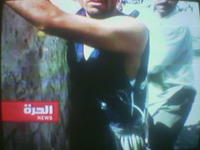 Actually the story was reportedby Al-Hurra on the same day of the attack (3 days ago) and that's where I captured the photo from. It's not a very good one but if you look closely you will see the wires hanging from the guy's waist that is surrounded by explosive materials. Well, that doesn't surprise me, it's not the first time Al-Qaeda uses similar techniques. |
| Yesterday I came across Normblog and found a post that contains links to the whole bunch of bloggers' profiles posted over the past two years. One profile caught my eye; that is the obviously imaginary interview with Saddam Hussein. While the whole thing is for fun, at least one thing came true one and a half year after the post was created: What would be your ideal choice of alternative profession or job? > Chemist. Or male underwear model. Hehehe. |
| It's been a year since Dean's World started to follow up Iraqi and Afghani bloggers. During this year, they presented many roundups that featured the most interesting of what had been posted on these blogs through the series of "Carnival of the Liberated". Today there's a summary for harvest of the year. |
Sunday, September 18, 2005
| A big congratulations from the heart to the Afghani people on this great day. It's another great victory for democracy and another defeat for terror, dictators and fascism. And by the way, Publius has a big roundup of news and commentary covering the historic event of the first free elections in Afghanistan. |
Saturday, September 17, 2005
A tough test for Iraqis.
| You have probably heard that Zarqawi has recently declared war on the Sheat in Iraq, that's 50-60 % of the people in a country of 27 millions, i.e. more than 13 million people are considered enemies by Zarqawi and they deserve to die! Of course this is not something unexpected from Al-Qaeda as this terror network hates nearly everyone on this earth except the ones who appease and apologize for what Al-Qaeda does. As far as I know, no one has welcomed this declaration of Zarqawi; it was strongly condemned by the Sheat and their clerics and politicians and even the association of Muslim scholars showed disagreement with this new strategy of Zarqawi, yet their announcement did not meet the requirements of the critical situation and their words were like a shy slap on Zarqawi's hand and certainly failed to ease the anger and worries of the Sheat who want to see the Sunni clerics declare Zarqawi out of Islam (an infidel). On the other hand, Iraqi militant groups like the Islamic army and the army of Mohammed and a few other groups were more direct in their statements reported by Azzaman: The goal of the resistance is striking the occupiers and their agents and collaborators and the calls for killing every Sheat is a fire that will burn the whole country with its Sunni and Sheat people Sistani as expected called for restraint and several local and regional news sources reported that he (or his office) gave a statement in which Sheat were asked to avoid violence "even if half of the Sheat got killed". Some of my friends made fun of Zarqawi and his declaration of war "So? Now he forgot all about America and Israel, blah blah blah and the Sheat became his sole enemy! I don't think this was Al-Qaeda's original slogan a few years ago!" said one of them and actually the observation is correct but the point is why? Why is this change in priorities and in targets? When Al-Qaeda first came to Iraq they claimed that they were fighting to liberate this part of "Islamic land" from the "infidels" and they appointed themselves as representatives and guardians of Iraq and its people. But now, after the Kurds and the Sheat chose their representatives, Al-Qaeda was left with only one segment to represent; that is the Sunni whom Al-Qaeda is now pretending to be defending and avenging from the atrocities of the government but this is also a big lie no doubt because Al-Qaeda had also warned the Sunni from joining the elections and the political process as a whole. Why? Because more Sunni people are expressing their will to participate in the next elections and many observers, polls and surveys expect a 80% turnout among the Sunni in the coming steps of the process; these are the October referendum and the December elections. Such a high turnout will eventually bring legitimate representatives for the Sunni population and that's what Al-Qeada doesn't want to see happen because there will be no one left to defend or fight for, no pretext for their war and Al-Qaeda will be farther apart from the Sunni militant groups that once were their close allies. This war declared by Al-Qaeda is frankly a war on elections, and the plan is to stop the elections from taking place at any cost and since confronting the American military has not brought any significant success, Zarqawi is switching to plan B, that is to provoke civil war in Iraq between the Sunni and the Sheat. This is going to be a tough test for the people of Iraq; a test for their will to stay united and a test for their ability to reason out things and how are they going to respond to this type of challenges. The next three months will be stressful and decisive for Iraqis and I really believe that Iraqi's future can be foreseen through the developments of these 90 day. These 90 days will either announce the total collapse of this country or it will bring a breakthrough that puts Iraq firmly on the right track. I see better chances for the latter possibility but the former still worries me. |
Thursday, September 15, 2005
Samarra learning from Talafar...
| Yesterday, the minister of defense met delegates from Samarra in his office. The visit arranged for by the head of the Sunni mortmain department sheikh Ahmed Al-Samarrai came after the minister declared that that the government is going to send troops to other cities including Samarra. The minister was straightforward in his speech and warned the delegates that if the city doesn't cooperate with the authorities in eliminating terror and criminal gangs, troops will have to enter the city and clean it up in a way similar to what happened in Talafar and the minister said that one month will be given to allow the city to take positive steps before power is used: Let the decision be yours brothers because if you let others decide for the city, that decision would be tough on you and your people. The delegates said they're going to use this chance to protect their city from military operations but there was also a tone of denial in their words; denial to the fact that Samarra hosts terror cells and they tried to show the case look like a conspiracy on their city by "outsiders" yet they didn't say who those outsiders were or where they come from. However, the minister embarrassed them when he said: American troops handed security tasks over to Iraqi forces in Najaf and they'll be soon doing the same in other southern cities. Why do you think is that?Without waiting for an answer, he continued: I tell you why. Those cities are much more stable when compared with cities in the west or north west like Samarra and the young people in the south are joining the security forces in growing numbers, so why don't you and your people do the same? I hereby announce that our doors are open for recruits from Samarra, encourage your young men to join the army to keep your city safe and peaceful. Obviously the massive Iraqi-American operation in Talafar is encouraging other cities to seek peaceful solutions with the government and the first move came from Samarra because of the difference between Samara and other cities in the west; Samarra is a city that depends on trade, tourism and some industry for income unlike Haditha or Qaim which depend mainly on agriculture for economy and Samarra is a bigger city when compared with Qaim or Hadith and remaining under siege for a long time can be devastating for such a city and that'e what the delegate emphasized in their talks with the minister. Moreover, the type of Islam present in Samarra is relatively moderate and the clerics are not as extreme as those in Anbar and that is expected to give negotiations some flexibility. This was not the 1st time we see such negotiations and all previous ones failed because the negotiators from Samarra didn't commit to their promises but who knows? Maybe seeing an imminent danger will push them to act wisely from now on. |
Wednesday, September 14, 2005
Al-Qaeda avenging Talafar.
| Today Al-Qaeda carried out their threat and launched their "final battle" that has no apparent goal other than killing the largest possible number of Iraqis. Maybe Al-Qaeda wants to exterminate all Iraqis as a start for exterminating mankind! Eleven explosions till now in Baghdad alone and the news are coming while I type these words. I passed by two of the car-bombs on my way home, one of them-gladly-failed to detonate and the driver was arrested, he was apparently trying to attack the interior ministry, the crowd that gathered in the scene say the driver was Syrian. A few minutes later I saw a big explosion that was close to the green zone. The other passengers in the mini bus were discussing the explosion in Kadhimiya that killed more than a hundred construction workers who were waiting for employers to hire them. The Al-Qaeda called it the "battle for avenging Talafar" and this gives us a clue of the extent of the losses inflicted upon Al-Qaeda by Iraqi and American troops and the anger and frustration associated with these losses. The huge losses of Al-Qaeda in Talafar were in my opinion a result of the poor training of the new recruits as many of the old, well trained fighters were either killed or arrested over the past two years. The new Al-Qaeda recruits are even getting generous in giving information after being arrested as one advisor of the interior ministry said yesterday; these information and confessions are more and more revealing the ties of Al-Qaeda's branch in Iraq with Syria and I guess that's why the American ambassador Khalilzad was so confident when he talked about Syria because the evidence now do not only indicate carelessness in monitoring the borders, they confirm the existence of cooperation in training and logistic support. Obviously the continuous American-Iraqi armies' operations in western Iraq have pushed Al-Qaeda to announce this "final battle" but actually this reminds me of Saddam when he felt that his end was nearing and called the battle "the hawasim" (the final or decisive) and it was indeed as it ended his reign. Al-Qaeda has never won a war before and I don't expect things to be different this time, except that this time they want the battle to be final which means the terrorists will pour all their resources and power into this battle so their defeat this time will hopefully pave the way for ending their presence in Iraq. |
Sunday, September 11, 2005
Chemical Weapons Alert!
| Al-Arabiya TV has breaking news about the operations in Tal-Afar saying that Al-Qaeda in Iraq is threatening to use chemical weapons!! No details so far. Update: Al-Arabiya says that the announcement was posted on a website that belongs to a "militant group calling themselves the army of the victorious sect". The terrorists threatened to "use nonconventional and chemical weapons against Iraqi and American troops if they don't withdraw from Tal-Afar". It's worth mentioning that this terror group was mentioned in the news for the 1st time after they claimed responsibility for the mortar attacks on the shrine of Imam Kadhum on the same day of the tragic stampede on the Aima bridge in Baghdad. |
Saturday, September 10, 2005
Iraq today...
| While the proposed constitution is going to be presented to the UN tomorrow, Mr. Khdair Al-Khuzaii (CDC member) said that the final changes will be uncovered tonight and he attributed the delay in printing and distributing the draft to the negotiations between the Kurdish bloc and the Sunni Arabs on the identity of the country while Bahaa Al-Araji (CDC member) accused the UN delegation of causing the delay by missing a meeting that was planned for last Thursday to discuss the mechanism of the printing and distribution process. From Al-Mada (Arabic). Al-Araji also claimed that there is pressure from President Talbani towards compromising with the Sunni Arabs to guarantee their participation. In this regard, some Sunni politicians visited Erbil to negotiate with the Kurdish leaders. The negotiations included two main issues, deba'athification and Iraq being (or not) a part of the Arab world. On the other hand, MP Abbas Al-Bayati said that the 5 million copies of the draft will handed to the ministry of trade by the mid September for the purpose of their distribution to the Iraqi families through the food rations-distribution system. This is aimed at giving the people enough time to study the articles of the draft before the October 15 referendum. It's worth mentioning that the "association of Muslim scholars" launched a campaign to discourage the voters from approving the "conspiracy" constitution. As described in one of the latest announcements of the association that was published on Al-Sabah newspaper. The council of national dialogue is starting a similar campaign and this shows that right now there are two different Sunni camps; one chose foiling the constitution while the other is still hoping for reaching a compromise. In fact, reading the association's announcement doesn't explain why they used the term "conspiracy" and there're no clear phrases as to what they're refusing in the draft except for very general headlines which shows tells that behind this announcement is the desire for refusal for the purpose of refusal itself; no suggestions, no offers and no constructive criticism. Security wise, wide military operations have begun in Tal-Afar. PM Jafari in a press conference this afternoon in Baghdad said that operations started by orders from the Iraqi government and that the decision to carry out the assault was pure Iraqi and came in response to requests from the residents of Tal-Afar who sought the government's help to get rid of the terror groups who captured the town. Al-Iraqia TV showed hundreds of Tal-Afar residents welcoming the Iraqi and multinational troops as they entered one of the town's districts. The demonstrators held signs expressing gratitude for the Iraqi troops that came to free Tal-Afar from the terrorists. The minister of defense said in the same press conferences that among the killed and captured terrorists were Arabs from several countries, namely Egypt, Jordan, Syria, Saudi Arabia, Tunis, Morocco, 'Palestine' and Sudan but the minister also seemed concerned that many Arab fighters might have escaped the town as most of the captured/killed terrorists and suspects were Iraqis. The minister declared that Iraqi forces will be preparing for further assaults on the remaining hot spots in western Iraq like Rawa, Ramadi and Qaim to clean these towns from terror cells. In a surprising step, Jordanian PM visited Baghdad today; this visit is considered to be a crack in the wall Arab countries built between them and Iraq's post Saddam governments. The significance of this visit comes form the fact that Jordan had been a safe house for boycotters and ex-Ba'athists who used Jordan as a place for their meetings and conferences and this visit came in my opinion as a clear message to western Iraq that says "you've got to catch up and enter the political arena". Few months ago, Jordan was so worried about Iraq's west and Sunnis but this visit has set a definite limit for the amount of support and endorsement that Jordan will offer to the boycotters. I guess this is likely going to shake the confidence of the ex-Ba'athists in what was once their second home. Away from all that, schools begin tomorrow in Iraq and around 6,000,000 Iraqi students will be distributed over some 20,000 schools nationwide. Universities will follow a week later; those are Iraq's future…let's wish them success. |
Friday, September 09, 2005
| Iraqi soldiers donate to Katrina victims: (Hat tip:ITM reader). “On behalf of myself and all the People of Tadji Military Base; I would like to console the American People and Government for getting this horrible disaster. So we would like to donate 1.000.000 Iraqi Dinars to help the government and the People also I would like to console all the ASTs who helped us rebuilding our country and our Army. We appreciate the American's help and support. Thank you". These were the words of Colonel Abbas Fadhil, commander of the Taji military base. The donated money is little, less than 700 $ and it can do practically nothing but the spirit and and words mean quite a lot. |
Thursday, September 08, 2005
| Tonight I'd like to introduce a new Iraqi blogger to you, Sooni. Well, not really new; the guy was a guest blogger on this blog a couple of times last year and he created his own blog some months ago but he started actual blogging only yesterday with this post in which he responded to Celine Dion's comment about Katrina, the rescue efforts and the war in Iraq. Check the blog out and leave some nice words if you have the time. |
Wednesday, September 07, 2005
In order to keep you updated on the constitutional process in Iraq, I translated this report from Baghdad's Al-Mashriq newspaper:Maryam Arrayis (CDC member) told Al-Mashriq that there will be minor changes to the current draft before sending it to the UN before this weekend. It's worth mentioning that the process of registering the voters has ended and there will be an extra million voter this time with a total of over 15.5 million voters. In Anbar province around 50,000 voters registered their names in the voter's lists in addition to the names that already exist. |
| By the way, it's election day in Egypt! As far as I know, news networks are not providing enough details so far, so I prefer to wait for news and updates from the Egyptian people themselves. |
Odd or even?
Monday, September 05, 2005
Reproducing Orwell's mill in Iran.
| Why is Iran choosing to defy the world withal the present dangers of a military reaction if Iran kept pushing things to the edge? Does Iran want to develop nuclear power for peaceful utilization? If that was the case then the European offer is very reasonable and I find it generous and it cannot be claimed (without rising suspicions) that this offer doesn't meet the needs for a peaceful program. Not only that, it even guarantees better support than if Iran depended on its own capabilities as Europe will be contributing with her nuclear expertise…but Iran refused the offer. Does Iran want to get nuclear weapons? Why not? The nuclear military power's been the ultimate dream the leaders of the region who want to protect their regimes from any possible plans of change and to have the ability to attack their enemies. But Iran realizes the idea that there are many countries out there that are going to stop her from possessing nukes and once some countries feel that Iran is too close to getting the weapons, they will no doubt take the move and destroy the infrastructure of the nuclear program and Israel is a strong candidate for conducting the mission here. It's fundamental that a strike with conventional, high precision weapons that are available for many countries is enough to destroy the Iranian dream without the least defensive response from Iran who lacks the practical ability of defending the nuclear facilities. So both of the above theories put Iran before an irrational choice as the current escalation doesn't indicate peaceful Iranian intentions and at the same time in contradicts Iran's defensive abilities…so why escalate? I think that Iran is seeking a limited confrontation and Iran is calculating the possible gains and losses well in this confrontation and the results expected by the regime there are: 1-Having the Iranian nuclear facilities destroyed. 2-Preparing the country for a take over by the extremists; in the way despotic regimes make their calculations, the resultant is positive. Iran thinks that this is not the appropriate time for the super powers to invade and change the regime in Tehran since the situation in Iraq doesn't encourage making such a move. And if Iran waited until the situation resolves in Iraq before taking critical steps like resuming the nuclear program then that escalation will impose greater threats on the regime itself not only the nuclear facilities while an escalation at the moment will result in limited reaction from the world limited to as much as destroying the facilities only while giving the regime the chance to halt any remaining sign of the struggling weak democracy in Iran; the nuclear facilities will serve just like the 'Mill' in Orwell's "Animal Farm". This scenario is not far from what we’ve seen in Iraq; Saddam challenged the world after facing growing internal crises which made him export his problems to Kuwait. He was seeking a confrontation with the whole world in an incomprehensible way that looked literally like suicide but Saddam like any other tyrant knew the results; losing Kuwait but gaining the "legitimate" right to silent any voice of internal opposition since the country is under external threats making any opposition look like treason. And that stage will be the worst timing for starting an opposition movement while the government is calling for "national unity" to face the foreign threats. Iran will push for a confrontation and whatever is proposed will not be viewed as convincing to Iran which will put the world before tow ways to choose from, either a limited confrontation that prolongs the lifetime of the regime and grants it more power on the inside OR success in possessing the nuclear weapons before the world makes the practical measures to stop Iran and Tehran is not willing to take a third option. |
| Sorry for the unexpected absence; my ISP shut the service down for a couple of days to do some "maitenance and upgrades". Anyway, I want to apologize for those who sent e mails and didn't receive replies till now; even if you don't get a reply, know that your message has been read. Blogging will be resumed later today as usual. |
Friday, September 02, 2005
| It seems that we were pretty much occupied with the bridge tragedy in Baghdad that we didn't keep track of the news elsewhere till last night when I discovered the magnitude of the humanitarian crisis in the hurricane affected areas in the US. I wish there was a way I could offer some help but there's nothing but prayers I can give from where I am. Knowing that people are dying and suffering in Louisiana hurts just as much as if that suffering and death were in Baghdad. Those people are in our thoughts and prayers. May God help them and guide their rescuers. |
Thursday, September 01, 2005
Yesterday's loss, today's fire and tomorrow's constitution…




